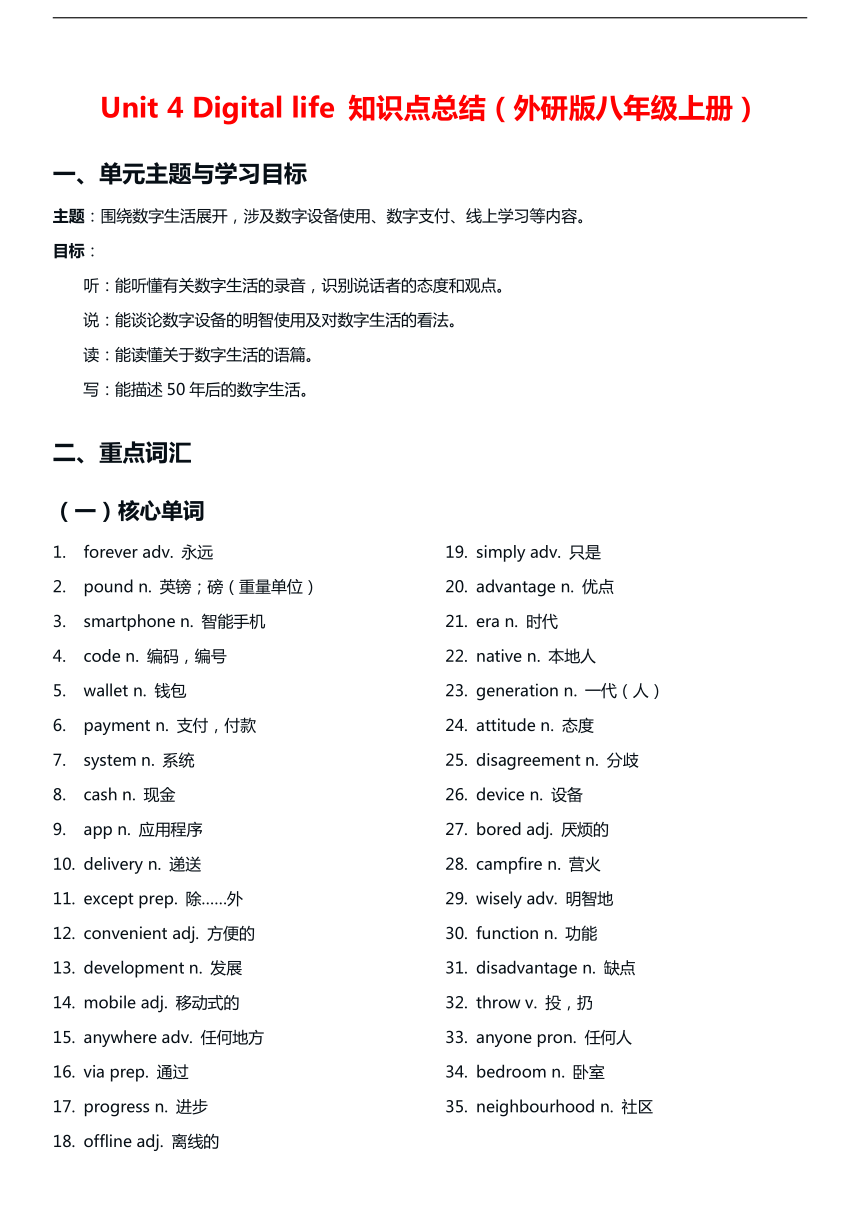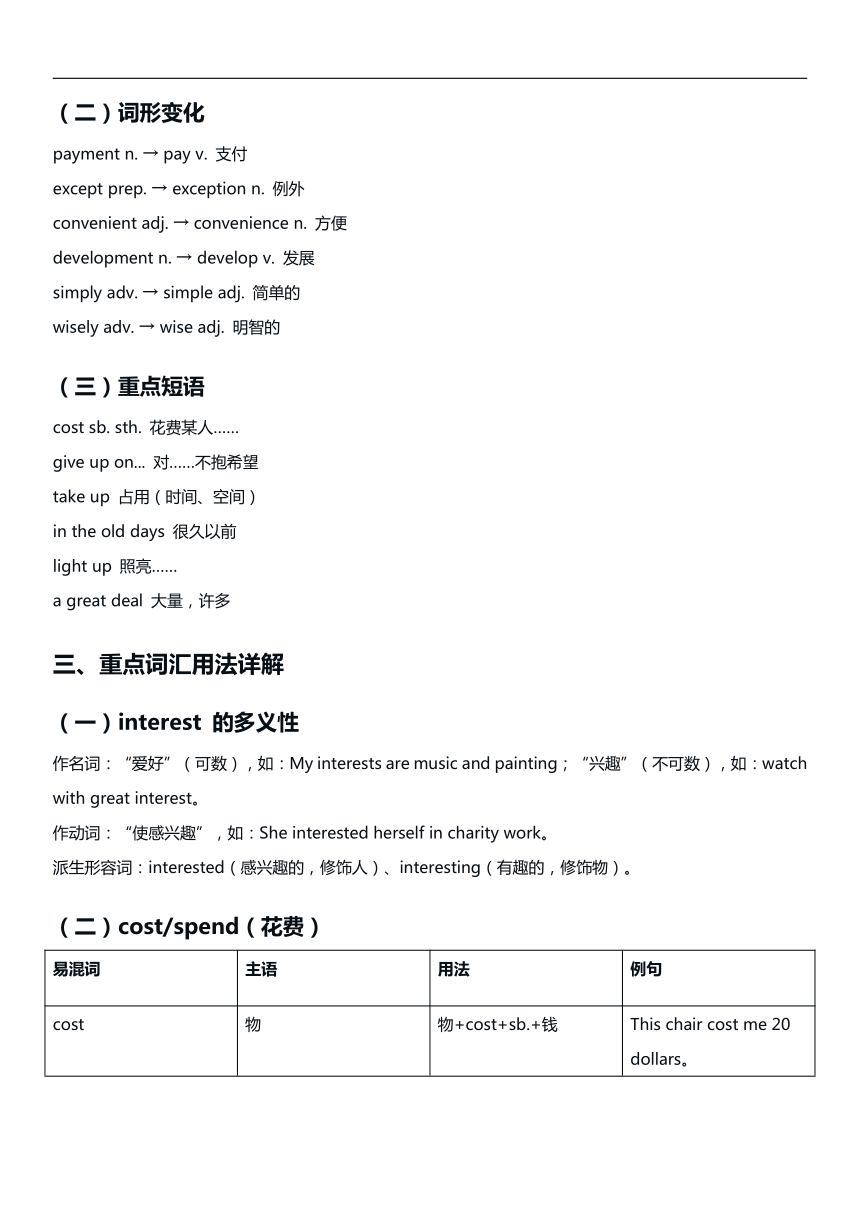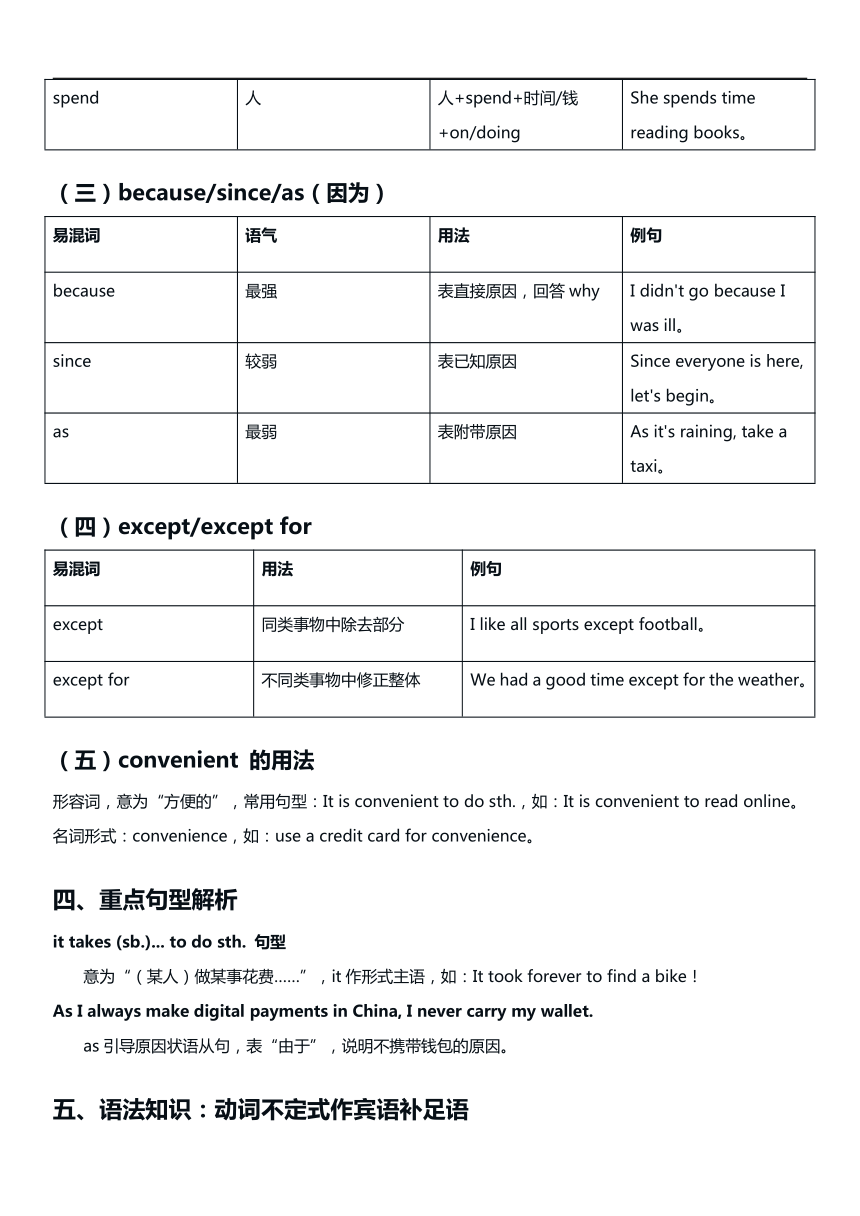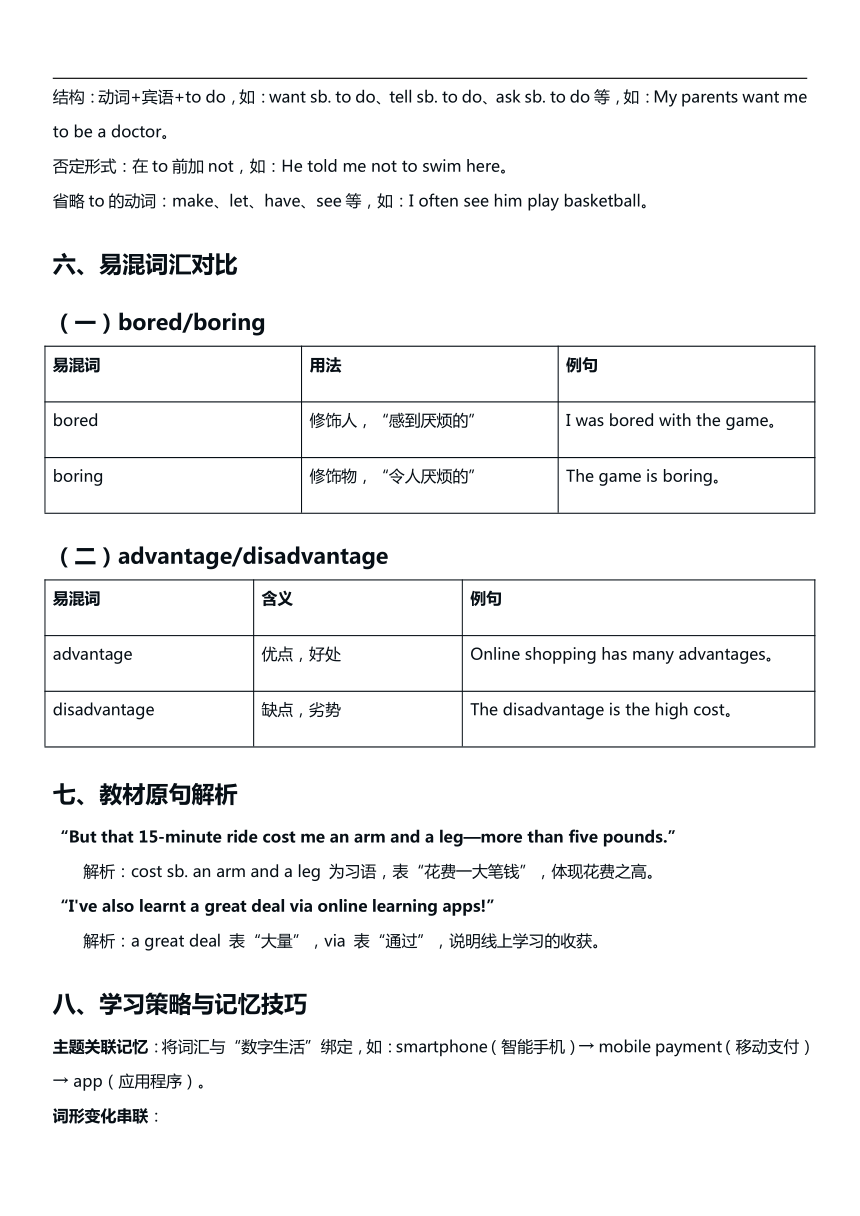Unit 4 Digital life 知识点外研版(2024)英语八年级上册
文档属性
| 名称 | Unit 4 Digital life 知识点外研版(2024)英语八年级上册 |  | |
| 格式 | docx | ||
| 文件大小 | 32.6KB | ||
| 资源类型 | 教案 | ||
| 版本资源 | 外研版 | ||
| 科目 | 英语 | ||
| 更新时间 | 2025-07-08 18:56:18 | ||
图片预览




文档简介
Unit 4 Digital life 知识点总结(外研版八年级上册)
一、单元主题与学习目标
主题:围绕数字生活展开,涉及数字设备使用、数字支付、线上学习等内容。
目标:
听:能听懂有关数字生活的录音,识别说话者的态度和观点。
说:能谈论数字设备的明智使用及对数字生活的看法。
读:能读懂关于数字生活的语篇。
写:能描述50年后的数字生活。
二、重点词汇
(一)核心单词
forever adv. 永远
pound n. 英镑;磅(重量单位)
smartphone n. 智能手机
code n. 编码,编号
wallet n. 钱包
payment n. 支付,付款
system n. 系统
cash n. 现金
app n. 应用程序
delivery n. 递送
except prep. 除……外
convenient adj. 方便的
development n. 发展
mobile adj. 移动式的
anywhere adv. 任何地方
via prep. 通过
progress n. 进步
offline adj. 离线的
simply adv. 只是
advantage n. 优点
era n. 时代
native n. 本地人
generation n. 一代(人)
attitude n. 态度
disagreement n. 分歧
device n. 设备
bored adj. 厌烦的
campfire n. 营火
wisely adv. 明智地
function n. 功能
disadvantage n. 缺点
throw v. 投,扔
anyone pron. 任何人
bedroom n. 卧室
neighbourhood n. 社区
(二)词形变化
payment n. → pay v. 支付
except prep. → exception n. 例外
convenient adj. → convenience n. 方便
development n. → develop v. 发展
simply adv. → simple adj. 简单的
wisely adv. → wise adj. 明智的
(三)重点短语
cost sb. sth. 花费某人……
give up on... 对……不抱希望
take up 占用(时间、空间)
in the old days 很久以前
light up 照亮……
a great deal 大量,许多
三、重点词汇用法详解
(一)interest 的多义性
作名词:“爱好”(可数),如:My interests are music and painting;“兴趣”(不可数),如:watch with great interest。
作动词:“使感兴趣”,如:She interested herself in charity work。
派生形容词:interested(感兴趣的,修饰人)、interesting(有趣的,修饰物)。
(二)cost/spend(花费)
易混词 主语 用法 例句
cost 物 物+cost+sb.+钱 This chair cost me 20 dollars。
spend 人 人+spend+时间/钱+on/doing She spends time reading books。
(三)because/since/as(因为)
易混词 语气 用法 例句
because 最强 表直接原因,回答why I didn't go because I was ill。
since 较弱 表已知原因 Since everyone is here, let's begin。
as 最弱 表附带原因 As it's raining, take a taxi。
(四)except/except for
易混词 用法 例句
except 同类事物中除去部分 I like all sports except football。
except for 不同类事物中修正整体 We had a good time except for the weather。
(五)convenient 的用法
形容词,意为“方便的”,常用句型:It is convenient to do sth.,如:It is convenient to read online。
名词形式:convenience,如:use a credit card for convenience。
四、重点句型解析
it takes (sb.)... to do sth. 句型
意为“(某人)做某事花费……”,it作形式主语,如:It took forever to find a bike!
As I always make digital payments in China, I never carry my wallet.
as引导原因状语从句,表“由于”,说明不携带钱包的原因。
五、语法知识:动词不定式作宾语补足语
结构:动词+宾语+to do,如:want sb. to do、tell sb. to do、ask sb. to do等,如:My parents want me to be a doctor。
否定形式:在to前加not,如:He told me not to swim here。
省略to的动词:make、let、have、see等,如:I often see him play basketball。
六、易混词汇对比
(一)bored/boring
易混词 用法 例句
bored 修饰人,“感到厌烦的” I was bored with the game。
boring 修饰物,“令人厌烦的” The game is boring。
(二)advantage/disadvantage
易混词 含义 例句
advantage 优点,好处 Online shopping has many advantages。
disadvantage 缺点,劣势 The disadvantage is the high cost。
七、教材原句解析
“But that 15-minute ride cost me an arm and a leg—more than five pounds.”
解析:cost sb. an arm and a leg 为习语,表“花费一大笔钱”,体现花费之高。
“I've also learnt a great deal via online learning apps!”
解析:a great deal 表“大量”,via 表“通过”,说明线上学习的收获。
八、学习策略与记忆技巧
主题关联记忆:将词汇与“数字生活”绑定,如:smartphone(智能手机)→ mobile payment(移动支付)→ app(应用程序)。
词形变化串联:
develop(v. 发展)→ development(n. 发展)
convenient(adj. 方便的)→ convenience(n. 方便)
语法口诀:
“不定式作宾补,to 不能丢,want、ask、tell 后常跟;
make、let、see 很特殊,to 要省略记清楚。”
短语对比:
take up(占用)vs. give up(放弃)
in the old days(过去)vs. in the future(未来)
语境运用:用“digital life”主题造句,如:Mobile payment makes life convenient.(移动支付使生活便利)。
近义词辨析:通过例句区分 except/except for,如:Except Tom, everyone came.(同类);The room is clean except for a few books.(不同类)。
功能分类:将数字设备相关词汇归类,如:device(设备)、app(应用)、system(系统),强化关联记忆。
反义词配对:advantage(优点)→ disadvantage(缺点);online(在线)→ offline(离线),通过对比加深印象。
介词搭配:记忆 via 的用法,如:learn via apps(通过应用学习);progress in(在……方面进步)。
习语积累:记住 cost an arm and a leg(花费巨大)、a great deal(大量)等固定表达。
语法应用:刻意练习不定式作宾补的句型,如:Teacher advised us to use phones wisely.(老师建议我们明智用手机)。
场景联想:想到“数字支付”时,联想 wallet(钱包)、cash(现金)、payment(支付)等词汇。
构词法记忆:掌握 -ment 后缀,如:agree→agreement、move→movement,类比 development 的构成。
词义拓展:了解 pound 既表“英镑”也表“磅”,如:5 pounds(5英镑/5磅)。
副词辨析:simply(只是)vs. easily(容易地),通过例句区分:It's simply a tool.(只是工具);He works easily.(轻松工作)。
句式转换:将 it takes... to do 句型与 spend 转换,如:It took me 2 hours to shop→I spent 2 hours shopping。
情感词汇:区分 bored(人感到烦)和 boring(事物无聊),如:I'm bored with the boring film。
实用短语:掌握 take up 的多义,如:The desk takes up space.(占用空间);take up reading(开始阅读)。
九、核心词汇场景应用
(一)pound 的双重含义
作“英镑”时,是英国货币单位,如:“But that 15-minute ride cost me an arm and a leg—more than five pounds.”(但这15分钟的行程花了我一大笔钱——五英镑多)。
作“磅”时,是重量单位,如:“I've lost six and a half pounds since I took exercise.”(自从锻炼以来,我瘦了六磅半)。
(二)payment 与 pay 的关联
payment 是名词,由“pay(动词,支付)+-ment(名词后缀)”构成,如:“the shop's payment system didn't work”(商店的支付系统出了问题)。
pay 作动词时,常见搭配“pay + 钱 + for sth.”,如:“My father paid 40 pounds for the desk.”(我爸爸花40英镑买了这张书桌)。
(三)mobile 的常见搭配
作形容词时,可构成“mobile phone(手机)”“mobile payment(移动支付)”等短语,如:“Mobile payment allows us to use our smartphones to pay for things easily.”(移动支付让我们能用智能手机轻松付款)。
十、短语辨析与拓展
(一)a great deal 与 a great deal of
a great deal 作副词短语,可修饰动词或形容词比较级,如:“I've also learnt a great deal via online learning apps!”(我还通过在线学习应用学到了很多)。
a great deal of 修饰不可数名词,表“大量”,如:“there's a great deal of information”(有大量信息)。
(二)give up on... 的用法
后接人或事物,表“对……不抱希望”,如:“When I got home, I was so tired that I gave up on cooking.”(到家时我太累了,就放弃做饭了)。
十一、语法难点突破
(一)it takes (sb.)... to do sth. 句型拓展
该句型中 it 为形式主语,真正主语是不定式,可表示时间、金钱或努力等,如:“It takes practice to play the piano well.”(弹好钢琴需要练习)。
(二)动词不定式作宾语补足语的省略情况
部分动词(如 make、let、see 等)后接不定式作宾补时省略 to,如:“I often see him play basketball after school.”(我经常看到他放学后打篮球)。
help 后可接带 to 或不带 to 的不定式,如:“I often help my mother (to) clean the room.”(我经常帮妈妈打扫房间)。
十二、易混词对比强化
(一)development 与 develop
development 是名词,表“发展”,常用短语“with the development of...”(随着……的发展),如:“With the development of science and technology...”(随着科技的发展)。
develop 是动词,表“发展;提高”,如:“She kept developing her skills...”(她不断提高自己的技能)。
(二)anywhere 的用法
作副词时,可用于肯定句表“任何地方”,如:“Online education helps us learn new things anytime, anywhere.”(在线教育帮助我们随时随地学习新东西)。
十三、教材原句深度解析
“As I always make digital payments in China, never carry my wallet.”
解析:as 引导原因状语从句,表“由于”,说明“不带钱包”的原因是“常用数字支付”,体现数字生活的便利性。
“Except for today, I've had a great holiday.”
解析:except for 用于修正整体情况(假期整体愉快,仅今天例外),强调不同类事物的细节修正。
十四、学习误区提醒
误:He spent 100 yuan to the book.(×)
正:He spent 100 yuan on the book.(√)(spend 后接“on sth.”或“(in) doing sth.”)。
误:It's convenient for you coming today.(×)
正:It's convenient for you to come today.(√)(“It is convenient to do sth.”为固定句型)。
十五、文化与学科链接
数字生活相关表达:
移动支付:mobile payment
在线学习:online learning
应用程序:app
这些词汇与信息技术、日常生活紧密相关,体现科技发展对生活的影响。
十六、高频考点链接
题目:It took me two hours ______ (finish) the work.
答案:to finish(考查“it takes sb. time to do sth.”句型)。
题目:We all like the movie ______ Tom.
A. except B. except for
答案:A(“我们”和“Tom”是同类,用 except)。
十七、记忆口诀汇总
(一)花费动词口诀
“cost 主语是物品,spend 主语必是人;
cost 物+钱/人+钱,spend on/doing 记心间。”
(二)不定式作宾补口诀
“不定式,作宾补,to 字常随动词后;
make, let, see 很特别,to 字省略莫停留;
help 之后可带可不带,灵活运用不用愁。”
十八、记忆技巧补充
词根词缀串联:
名词后缀 -ment:pay→payment、develop→development、agree→agreement,通过共同后缀关联记忆。
场景归类记忆:
数字支付相关:wallet(钱包)、cash(现金)、payment(支付)、system(系统),集中记忆同一场景词汇。
对比表格记忆:
制作 except/except for、because/since/as 等易混词对比表,标注用法和例句,直观区分差异。
一、单元主题与学习目标
主题:围绕数字生活展开,涉及数字设备使用、数字支付、线上学习等内容。
目标:
听:能听懂有关数字生活的录音,识别说话者的态度和观点。
说:能谈论数字设备的明智使用及对数字生活的看法。
读:能读懂关于数字生活的语篇。
写:能描述50年后的数字生活。
二、重点词汇
(一)核心单词
forever adv. 永远
pound n. 英镑;磅(重量单位)
smartphone n. 智能手机
code n. 编码,编号
wallet n. 钱包
payment n. 支付,付款
system n. 系统
cash n. 现金
app n. 应用程序
delivery n. 递送
except prep. 除……外
convenient adj. 方便的
development n. 发展
mobile adj. 移动式的
anywhere adv. 任何地方
via prep. 通过
progress n. 进步
offline adj. 离线的
simply adv. 只是
advantage n. 优点
era n. 时代
native n. 本地人
generation n. 一代(人)
attitude n. 态度
disagreement n. 分歧
device n. 设备
bored adj. 厌烦的
campfire n. 营火
wisely adv. 明智地
function n. 功能
disadvantage n. 缺点
throw v. 投,扔
anyone pron. 任何人
bedroom n. 卧室
neighbourhood n. 社区
(二)词形变化
payment n. → pay v. 支付
except prep. → exception n. 例外
convenient adj. → convenience n. 方便
development n. → develop v. 发展
simply adv. → simple adj. 简单的
wisely adv. → wise adj. 明智的
(三)重点短语
cost sb. sth. 花费某人……
give up on... 对……不抱希望
take up 占用(时间、空间)
in the old days 很久以前
light up 照亮……
a great deal 大量,许多
三、重点词汇用法详解
(一)interest 的多义性
作名词:“爱好”(可数),如:My interests are music and painting;“兴趣”(不可数),如:watch with great interest。
作动词:“使感兴趣”,如:She interested herself in charity work。
派生形容词:interested(感兴趣的,修饰人)、interesting(有趣的,修饰物)。
(二)cost/spend(花费)
易混词 主语 用法 例句
cost 物 物+cost+sb.+钱 This chair cost me 20 dollars。
spend 人 人+spend+时间/钱+on/doing She spends time reading books。
(三)because/since/as(因为)
易混词 语气 用法 例句
because 最强 表直接原因,回答why I didn't go because I was ill。
since 较弱 表已知原因 Since everyone is here, let's begin。
as 最弱 表附带原因 As it's raining, take a taxi。
(四)except/except for
易混词 用法 例句
except 同类事物中除去部分 I like all sports except football。
except for 不同类事物中修正整体 We had a good time except for the weather。
(五)convenient 的用法
形容词,意为“方便的”,常用句型:It is convenient to do sth.,如:It is convenient to read online。
名词形式:convenience,如:use a credit card for convenience。
四、重点句型解析
it takes (sb.)... to do sth. 句型
意为“(某人)做某事花费……”,it作形式主语,如:It took forever to find a bike!
As I always make digital payments in China, I never carry my wallet.
as引导原因状语从句,表“由于”,说明不携带钱包的原因。
五、语法知识:动词不定式作宾语补足语
结构:动词+宾语+to do,如:want sb. to do、tell sb. to do、ask sb. to do等,如:My parents want me to be a doctor。
否定形式:在to前加not,如:He told me not to swim here。
省略to的动词:make、let、have、see等,如:I often see him play basketball。
六、易混词汇对比
(一)bored/boring
易混词 用法 例句
bored 修饰人,“感到厌烦的” I was bored with the game。
boring 修饰物,“令人厌烦的” The game is boring。
(二)advantage/disadvantage
易混词 含义 例句
advantage 优点,好处 Online shopping has many advantages。
disadvantage 缺点,劣势 The disadvantage is the high cost。
七、教材原句解析
“But that 15-minute ride cost me an arm and a leg—more than five pounds.”
解析:cost sb. an arm and a leg 为习语,表“花费一大笔钱”,体现花费之高。
“I've also learnt a great deal via online learning apps!”
解析:a great deal 表“大量”,via 表“通过”,说明线上学习的收获。
八、学习策略与记忆技巧
主题关联记忆:将词汇与“数字生活”绑定,如:smartphone(智能手机)→ mobile payment(移动支付)→ app(应用程序)。
词形变化串联:
develop(v. 发展)→ development(n. 发展)
convenient(adj. 方便的)→ convenience(n. 方便)
语法口诀:
“不定式作宾补,to 不能丢,want、ask、tell 后常跟;
make、let、see 很特殊,to 要省略记清楚。”
短语对比:
take up(占用)vs. give up(放弃)
in the old days(过去)vs. in the future(未来)
语境运用:用“digital life”主题造句,如:Mobile payment makes life convenient.(移动支付使生活便利)。
近义词辨析:通过例句区分 except/except for,如:Except Tom, everyone came.(同类);The room is clean except for a few books.(不同类)。
功能分类:将数字设备相关词汇归类,如:device(设备)、app(应用)、system(系统),强化关联记忆。
反义词配对:advantage(优点)→ disadvantage(缺点);online(在线)→ offline(离线),通过对比加深印象。
介词搭配:记忆 via 的用法,如:learn via apps(通过应用学习);progress in(在……方面进步)。
习语积累:记住 cost an arm and a leg(花费巨大)、a great deal(大量)等固定表达。
语法应用:刻意练习不定式作宾补的句型,如:Teacher advised us to use phones wisely.(老师建议我们明智用手机)。
场景联想:想到“数字支付”时,联想 wallet(钱包)、cash(现金)、payment(支付)等词汇。
构词法记忆:掌握 -ment 后缀,如:agree→agreement、move→movement,类比 development 的构成。
词义拓展:了解 pound 既表“英镑”也表“磅”,如:5 pounds(5英镑/5磅)。
副词辨析:simply(只是)vs. easily(容易地),通过例句区分:It's simply a tool.(只是工具);He works easily.(轻松工作)。
句式转换:将 it takes... to do 句型与 spend 转换,如:It took me 2 hours to shop→I spent 2 hours shopping。
情感词汇:区分 bored(人感到烦)和 boring(事物无聊),如:I'm bored with the boring film。
实用短语:掌握 take up 的多义,如:The desk takes up space.(占用空间);take up reading(开始阅读)。
九、核心词汇场景应用
(一)pound 的双重含义
作“英镑”时,是英国货币单位,如:“But that 15-minute ride cost me an arm and a leg—more than five pounds.”(但这15分钟的行程花了我一大笔钱——五英镑多)。
作“磅”时,是重量单位,如:“I've lost six and a half pounds since I took exercise.”(自从锻炼以来,我瘦了六磅半)。
(二)payment 与 pay 的关联
payment 是名词,由“pay(动词,支付)+-ment(名词后缀)”构成,如:“the shop's payment system didn't work”(商店的支付系统出了问题)。
pay 作动词时,常见搭配“pay + 钱 + for sth.”,如:“My father paid 40 pounds for the desk.”(我爸爸花40英镑买了这张书桌)。
(三)mobile 的常见搭配
作形容词时,可构成“mobile phone(手机)”“mobile payment(移动支付)”等短语,如:“Mobile payment allows us to use our smartphones to pay for things easily.”(移动支付让我们能用智能手机轻松付款)。
十、短语辨析与拓展
(一)a great deal 与 a great deal of
a great deal 作副词短语,可修饰动词或形容词比较级,如:“I've also learnt a great deal via online learning apps!”(我还通过在线学习应用学到了很多)。
a great deal of 修饰不可数名词,表“大量”,如:“there's a great deal of information”(有大量信息)。
(二)give up on... 的用法
后接人或事物,表“对……不抱希望”,如:“When I got home, I was so tired that I gave up on cooking.”(到家时我太累了,就放弃做饭了)。
十一、语法难点突破
(一)it takes (sb.)... to do sth. 句型拓展
该句型中 it 为形式主语,真正主语是不定式,可表示时间、金钱或努力等,如:“It takes practice to play the piano well.”(弹好钢琴需要练习)。
(二)动词不定式作宾语补足语的省略情况
部分动词(如 make、let、see 等)后接不定式作宾补时省略 to,如:“I often see him play basketball after school.”(我经常看到他放学后打篮球)。
help 后可接带 to 或不带 to 的不定式,如:“I often help my mother (to) clean the room.”(我经常帮妈妈打扫房间)。
十二、易混词对比强化
(一)development 与 develop
development 是名词,表“发展”,常用短语“with the development of...”(随着……的发展),如:“With the development of science and technology...”(随着科技的发展)。
develop 是动词,表“发展;提高”,如:“She kept developing her skills...”(她不断提高自己的技能)。
(二)anywhere 的用法
作副词时,可用于肯定句表“任何地方”,如:“Online education helps us learn new things anytime, anywhere.”(在线教育帮助我们随时随地学习新东西)。
十三、教材原句深度解析
“As I always make digital payments in China, never carry my wallet.”
解析:as 引导原因状语从句,表“由于”,说明“不带钱包”的原因是“常用数字支付”,体现数字生活的便利性。
“Except for today, I've had a great holiday.”
解析:except for 用于修正整体情况(假期整体愉快,仅今天例外),强调不同类事物的细节修正。
十四、学习误区提醒
误:He spent 100 yuan to the book.(×)
正:He spent 100 yuan on the book.(√)(spend 后接“on sth.”或“(in) doing sth.”)。
误:It's convenient for you coming today.(×)
正:It's convenient for you to come today.(√)(“It is convenient to do sth.”为固定句型)。
十五、文化与学科链接
数字生活相关表达:
移动支付:mobile payment
在线学习:online learning
应用程序:app
这些词汇与信息技术、日常生活紧密相关,体现科技发展对生活的影响。
十六、高频考点链接
题目:It took me two hours ______ (finish) the work.
答案:to finish(考查“it takes sb. time to do sth.”句型)。
题目:We all like the movie ______ Tom.
A. except B. except for
答案:A(“我们”和“Tom”是同类,用 except)。
十七、记忆口诀汇总
(一)花费动词口诀
“cost 主语是物品,spend 主语必是人;
cost 物+钱/人+钱,spend on/doing 记心间。”
(二)不定式作宾补口诀
“不定式,作宾补,to 字常随动词后;
make, let, see 很特别,to 字省略莫停留;
help 之后可带可不带,灵活运用不用愁。”
十八、记忆技巧补充
词根词缀串联:
名词后缀 -ment:pay→payment、develop→development、agree→agreement,通过共同后缀关联记忆。
场景归类记忆:
数字支付相关:wallet(钱包)、cash(现金)、payment(支付)、system(系统),集中记忆同一场景词汇。
对比表格记忆:
制作 except/except for、because/since/as 等易混词对比表,标注用法和例句,直观区分差异。
同课章节目录
